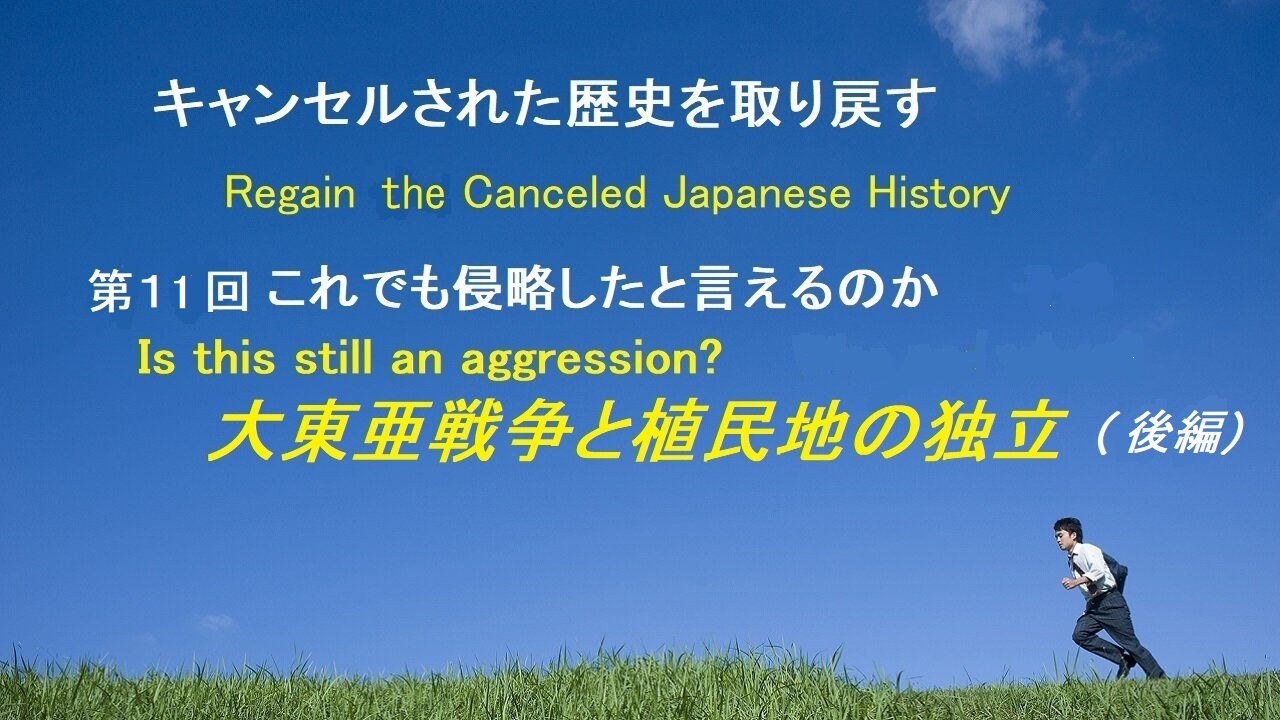Premium Only Content

part 11, "The Greater East Asia War and The Asian Independence"
Is this still an invasion?
This is part 11, the second part of The Greater East Asia War and The Asian Independence.
Tani Yutaka, then three years old, and his Japanese family had also moved from Fukuoka Prefecture to Terenganu, the capital of the southern state of the Malay Peninsula, where they ran a dry cleaning and barber shop.
When the Manchurian Incident occurred, it was used as a pretext for anti-Japanese sentiment in Trenganu, and overseas Chinese began to attack Japanese shops, looting and throwing stones.
It was November 1932, Yutaka had returned to Japan for a draft check and his young sister was lying alone with a cold. Tragedy struck at this time.
An overseas Chinese cut off his sister's neck with a blue dragon sword and held it up during an anti-Japanese demonstration.
When the young man returned, he made a vow. He vowed to take revenge on the overseas Chinese and the British, who were behind the anti-Japanese agitation.
Tani Yutaka was then ostensibly a rubber traiding merchant, but he became the master of hundreds of bandits, ravaging overseas Chinese and British troops as their enemies.
He was very popular with the locals, helping the sick and the poor, and fighting off the overseas Chinese who were controlling the local economy through their ties with the British.
He became known as Harimao, the Tiger of Malaya, and was feared by the British and overseas Chinese.
He is caught and sent to prison, but his Subordinates save him soon and he escapes.
He came to the attention of the Japanese military intelligence service and used bribes to get out of a Thai prison.
He and his men then began to cooperate with the agency.
The army has to fight as soon as it is ordered to do so. Even in times of peace, it is the job of the military to train, plan and prepare for emergencies.
Against the Soviet Union, Japanese army had a plan in place, but it had not been able to fight in the south because Japanese government had not anticipated it.
And that's assuming that the US will export the oil to Japan. However, the situation in the United States became more and more suspicious.
The US policy of exclusion from Japan had continued up to that time, but from about May 1937 the US had broken its neutrality and increased its military assistance to the Chiang Kai-shek administration in its fight against Japan.
If we don't, we may be cut off from oil. In advance, the Japanese military began to conduct intelligence operations in the south.
As well as maps, it was necessary to research roads, rivers, food conditions, availability of drinking water, endemic diseases and even pests and poisonous snakes in the jungle.
In September 1940, Japan finally concluded the Tripartite Pact in order to restrain Britain and the United States.
In fact, when the US banned the export of oil, Japan began to negotiate with the Netherlands to import oil, but the US worked behind the scenes and the Netherlands would not sell.
The American demand, as stated in the Hull Note, was, in a word, that Japan should withdraw from the mainland Chinese market.
If Japan did not anything, Japan would have had an oil crisis, electricity would have been cut off, factories would have shut down, and the streets would have been filled with unemployed people. Some would have starved to death.
Later, MacArthur himself testified in the US Joint Committee on Military and Foreign Affairs in 1951 that Japan's reasons for war were largely security-related.
So what do the people of the countries that were actually colonised and then became independent think of Japan?
In his book, "Dawn of Burma", Myanmar's first Prime Minister Ba Maw wrote that if you look at history, no country has contributed more to the liberation of Asia from white rule than Japan.
In Independence Square in Jakarta, the capital of Indonesia, there is a large monument with the date 17-8-05 written on it.
It is the 17th of August, the day of our independence, and 05 is inscribed not with the Western calendar, but with the year 2005, in honour of Japan.
This is a statue of General Sudairman, sent from Indonesia, at the Ministry of Defence.
He was the Supreme Commander who fought alongside Japanese soldiers in the War of Independence. A wreath-laying ceremony is held every year on 17 August.
Thailand's Prime Minister, Gen. Kukrit Pramod, recalled the Greater East Asia War in the following words, entitled "8 December.
Thanks to Japan, all Asian countries became independent. The mother, Japan, had a difficult childbirth and the mother was damaged, but the child was born and is growing up well.
The 8th of December is the day on which your mother made the momentous decision to risk her life. The 15th of August is the day when our dear mother fell ill. We must not forget these two days.
According to Tomohisa Hayakawa, secretary to Taiwanese former President Lee Teng-Hui, "Lee Teng-Hui always said that Japan is indispensable to Taiwan, but Taiwan is also indispensable to Japan.
He said, "We must not forget that when Lee Teng-hui said, 'I have left Taiwan to you,' he was speaking to us, the Japanese people. These words are the legacy of Lee Teng-Hui.
This would mean that a contingency in Taiwan is a contingency in Japan. We must be aware that there are countries like this in Asia.
That concludes Part 11, The Greater East Asia War and Asian Independence. We will see you again
-
 2:57:09
2:57:09
TimcastIRL
4 hours agoCorporate Press Refuses To Mention Minneapolis Shooter Was Trans | Timcast IRL
158K78 -
 LIVE
LIVE
Akademiks
3 hours agoWar in RAT-LANTA. Young Thug vs Gunna vs Ralo vs YSL MONDO. Who Will Le Bebe Pick. FINAL CRASHOUT!
2,061 watching -
 1:02:24
1:02:24
Man in America
7 hours agoThe Final Battle: Nanotech, Transhumanism & the War for Your Soul w/ Dr. Ed Group
20.4K2 -
 39:56
39:56
Sarah Westall
1 hour agoUpcoming World Wide Economic Collapse/Deep Recession & What the Big Money is Doing w/ Ed Dowd
6.76K3 -

Barry Cunningham
3 hours agoIT'S MOVIE NIGHT WITH BARRY!
23.6K16 -
 31:05
31:05
The Why Files
2 days agoPeru's Most Terrifying Mystery | The Face Peelers
29.9K41 -
 1:32
1:32
Gaming on Rumble
11 hours agoWhat is the Rumble Creator Program?!?! | Lvl UP
21.9K4 -

Flyover Conservatives
23 hours ago9/11 on Steroids: What’s Coming This Fall? - Bo Polny | FOC Show
28.8K2 -
 1:01:28
1:01:28
Precision Rifle Network
8 hours agoS4E27 Guns & Grub - Let's Talk About Gas Guns
15K1 -
 59:29
59:29
The Charlie Kirk Show
4 hours agoTHOUGHTCRIME Ep. 96 — The Great Flag Burning Debate
42.1K34